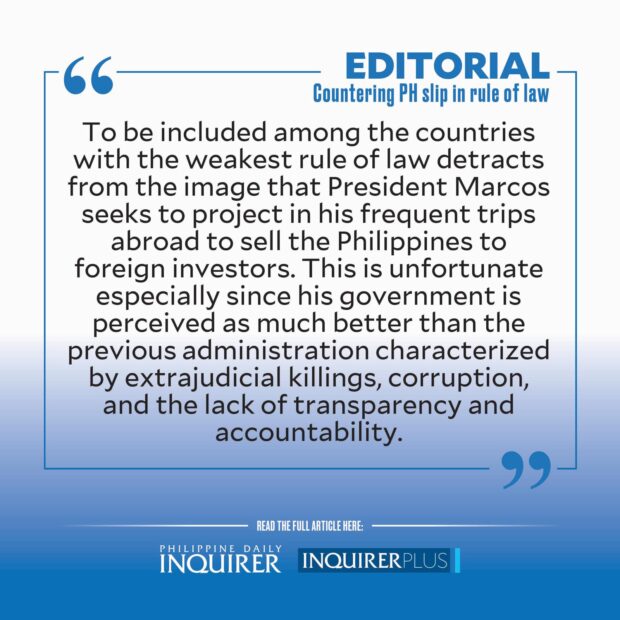Countering PH slip in rule of law

The drop in the Philippines’ score in a global ranking on adherence to the rule of law—100th out of 142 countries and 13th out of 15 countries in the Asia Pacific—should be a major concern for the Marcos administration as it battles economic challenges and maritime dispute with its powerful neighbor.
President Marcos started off on the right foot after winning a landslide victory in the 2022 elections, putting up a Cabinet composed of competent secretaries and steering a more open and more efficient government. More significantly, Mr. Marcos gained stature domestically and internationally by junking his predecessor’s bloody war on drugs, and revitalizing relations with the country’s traditional Western allies that former president Rodrigo Duterte had set aside to foster closer ties with China despite its incursions in the West Philippine Sea.
Not surprisingly, Mr. Marcos’ election led to an improvement in the country’s ranking in the World Justice Project (WJP), scoring 0.47 in 2022 from 0.46 in 2021 and placing 97th out of 140 countries. Under the Rule of Law Index, countries are scored 0 to 1, with 1 demonstrating the highest adherence to the rule of law, defined as a “durable system of laws, institutions, norms, and commitment that delivers four universal principles: accountability, just law, open government, and accessible and impartial justice.”
But the good news didn’t last long. This year, the Philippines again dropped to 0.46, making it among the countries in the world and in the region where rule of law is seen as weakest, faring just above Myanmar and Cambodia and well below the region’s average score of 0.59.
In five out of eight factors used to measure the Rule of Law Index, the Philippines dropped in terms of constraints on government powers (or the extent to which officials are held accountable, and where there is press freedom), absence of corruption, open government, regulatory enforcement, and criminal justice. Its scores on fundamental rights and civil justice remain unchanged, while it gained a slight increase in terms of order and security.
If it’s any consolation, the WJP noted that rule of law has eroded in majority of the countries surveyed in 2022 and 2023. “The world remains gripped by a rule of law recession characterized by executive reach, curtailing of human rights, and justice systems that are failing to meet people’s needs,” said WJP co-founder and president William H. Neukom.
To be included among the countries with the weakest rule of law detracts from the image that Mr. Marcos seeks to project in his frequent trips abroad to sell the Philippines to foreign investors. This is unfortunate especially since his government is perceived as much better than the previous administration characterized by extrajudicial killings, corruption, and the lack of transparency and accountability.
While the international ranking appears to be a mere survey, it chips away at the country’s global standing that consequently has a bearing on the international aid and foreign investments badly needed for post-pandemic recovery.
The slip in ranking couldn’t have come at a more inauspicious time, just as the Philippines is gaining the upper hand in global perception and support in its fight against China’s increasing aggression in the West Philippine Sea, and its moral victory for the rule of law in the region.
Clearly, there are crucial issues that the Marcos administration should promptly address if it wants to be seen as a country with democratic and moral values that deserve the support of its allies in upholding its territorial rights and international law in the region.
A good start is adherence to the WJP’s eight factors in tackling the issues of corruption, lack of transparency in government, and respect for human rights—areas where government has been remiss, thus justifying the country’s low ranking in the survey.
For one, it had been a year since hard-hitting broadcaster Percival “Percy Lapid” Mabasa was murdered but the alleged masterminds remain fugitives of the law. Critics and militants continue to be targets of Red-tagging by government officials, and killings by police have not abated. The controversy over the allocation of billions of taxpayer money for confidential and intelligence funds in agencies not mandated to use such sums legitimately has conveyed a lack of accountability and skewed priorities as well.
All these issues contribute to the public perception of a weak leadership, or worse, a government no better than the bad one that voters had replaced with a historic margin.
In a country mired in poverty, one might ask: But can we eat the rule of law? Asserts the WJP: “Research shows that the rule of law correlates to higher economic growth, greater peace, more education, and improved health outcomes.” That the perennial topnotchers in the rule of law ranking are First World countries, such as Denmark, Norway, Finland, Sweden, and Germany, proves that the adherence to such universal aspiration is vital to our well-being and progress as a nation.




















